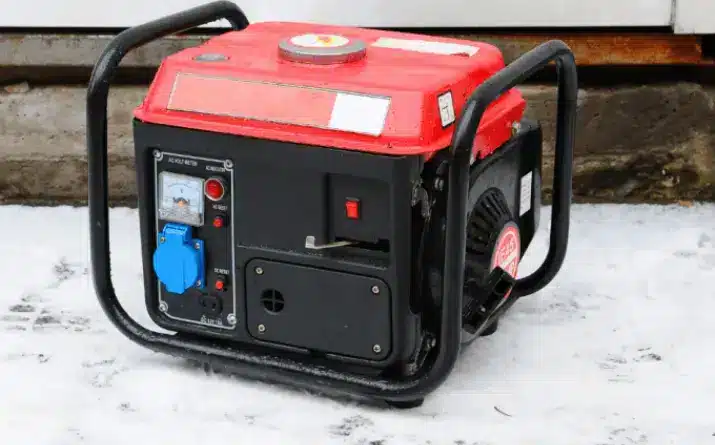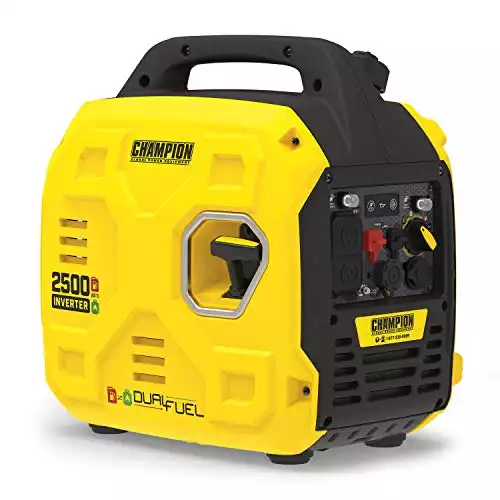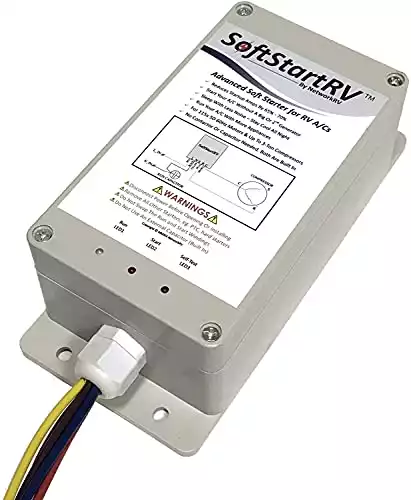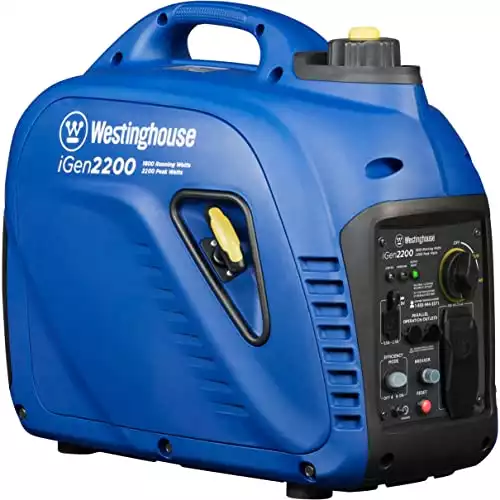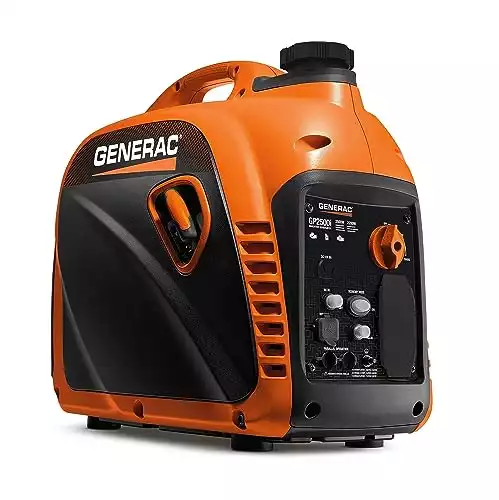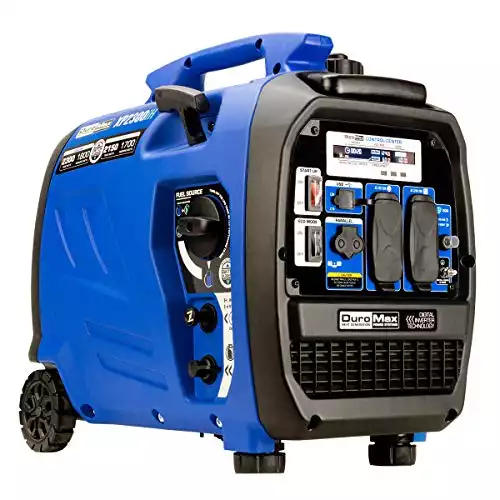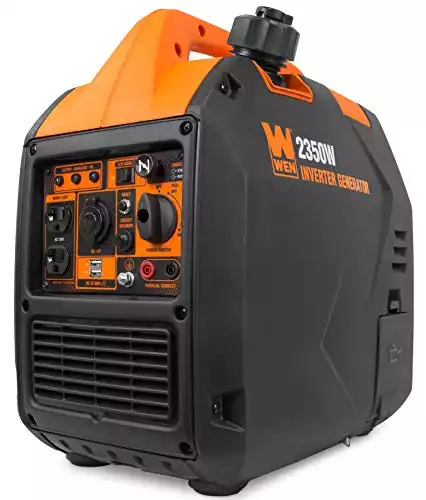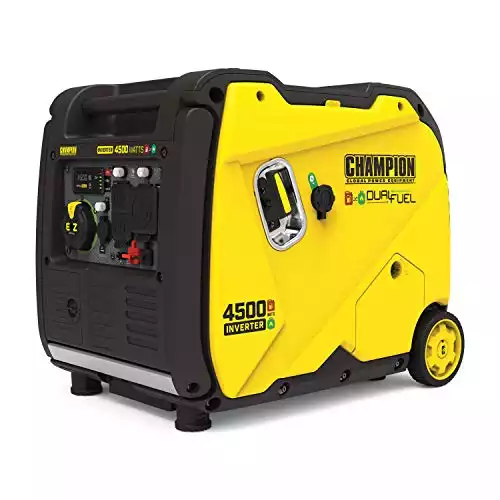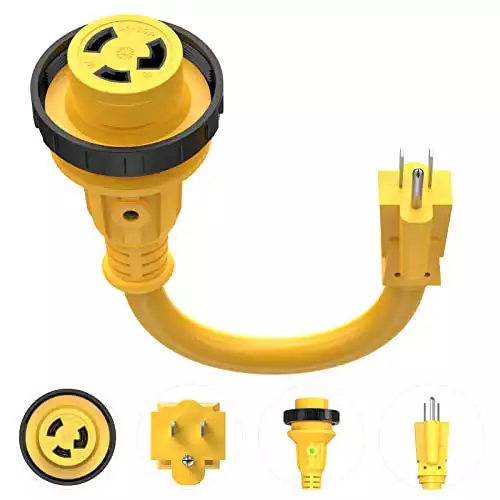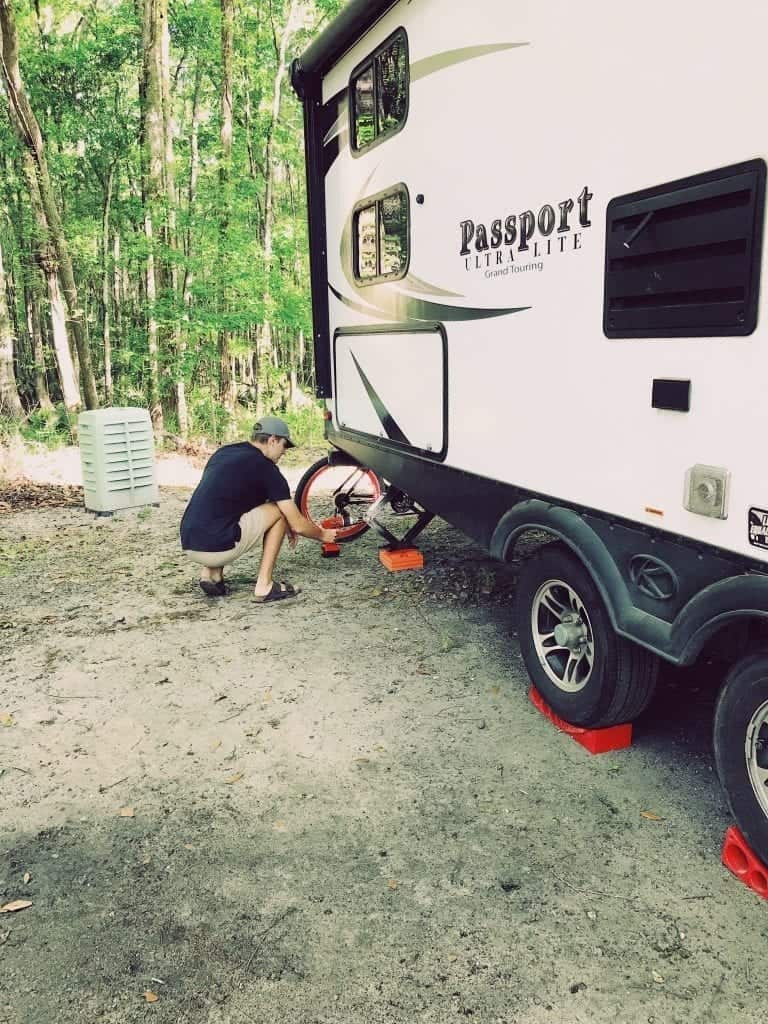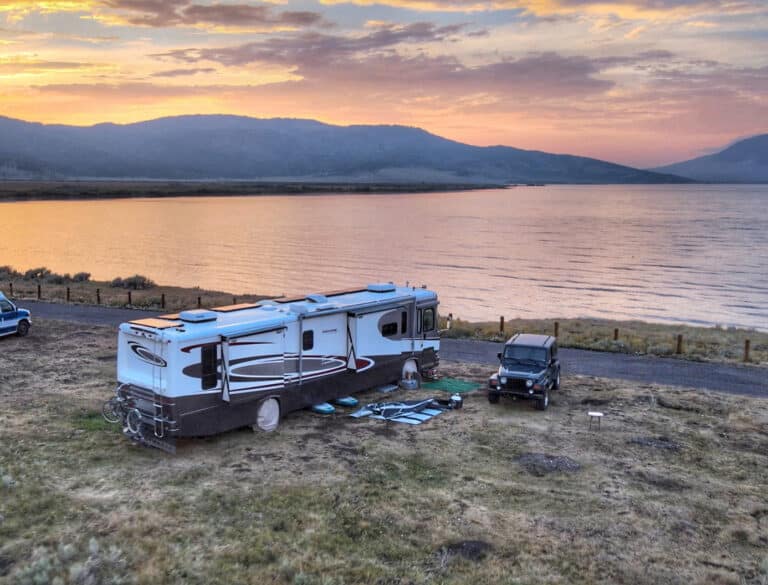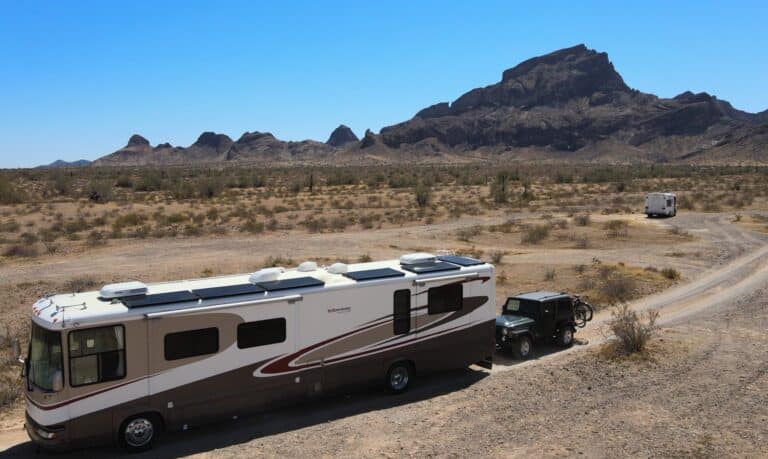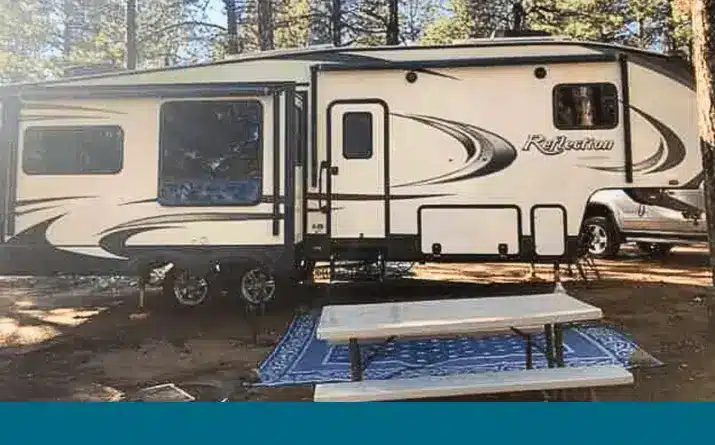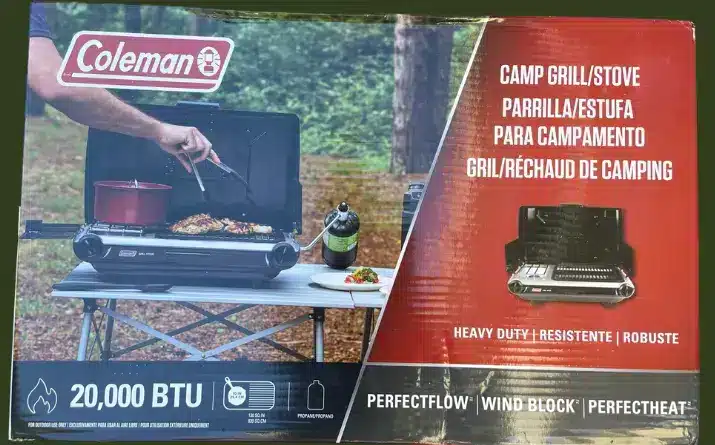7 Best RV Generators to Power Outdoor Adventures
This goes without saying, but I’m going to say it: The best RV generators for you are the ones that fit well with your particular lifestyle, travel goals, and budget. I cover a lot of ground in this article. By the end, you should understand the key features to consider when choosing which generator is a good option for your situation.
We are not reviewing a dozen units here. Rather, we were selective when finalizing our top picks of the best portable generators. We sifted through the details, from the number of USB ports and output power to inverter technology and fuel source. This blog post will give you the right information to find a good generator to power your adventures in the great outdoors.
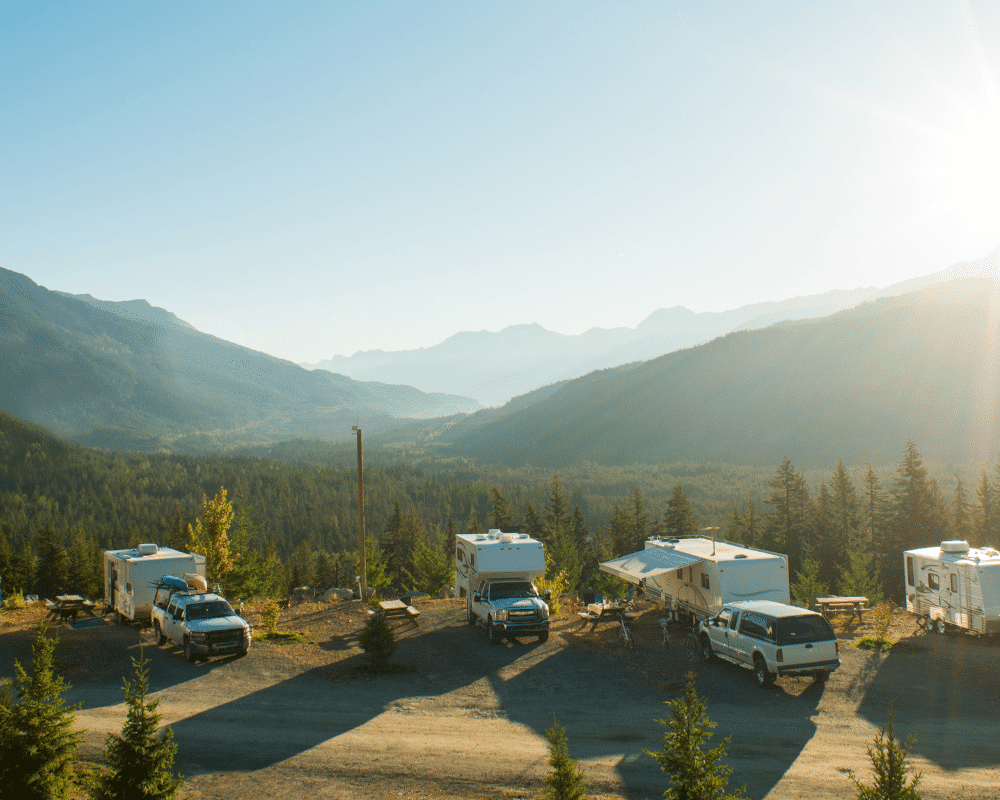
I have only one regret when it comes to our experience as full-time RVers. I wish we had been able to do more boondocking and dry RV camping. Instead, always needed to camp at RV parks and campgrounds with access to electric (shore power) connections.
If I could change one thing, I would bring an RV generator along for the ride.
No, I’m not complaining, believe me! I have fantastic memories of the time my family spent together on the road in our travel trailer. But in hindsight, our horizons would have expanded significantly with some extra power options on board.
Get a top generator for your trailer or motorhome and you will maximize your RV travel experiences. Being power independent can open up a whole new world of road travel. And experiencing the natural wonders across this continent is what it’s all about.
Related Reading: What is Boondocking?
Top RV Generators Summary Chart
You may not have the time to read the detailed descriptions we provide below covering each generator. So, I will start with a simple comparison chart that gives you a snapshot of how they all stack up.
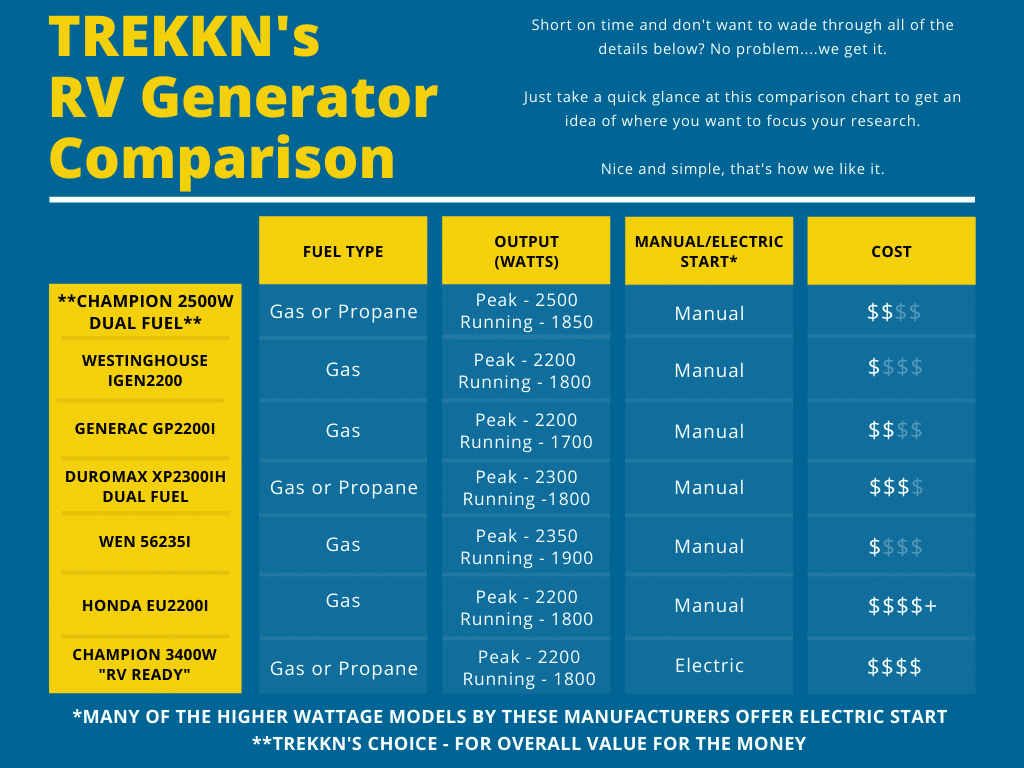
TREKKN is ready-supported. We may earn a small commission for qualifying purchases, at no additional cost to you. Please read our disclosure for more information.
The Best Portable Inverter Generators for RVs
Now that you’ve seen the overview chart, let’s jump into all of the down-and-dirty details. In this post, you will discover the best portable generator for your needs.
Notice in the headline above that we chose to limit the scope of this list to the “portable inverter generator” category. The reason is simple. No matter how you look at it, portable inverter generators make the most sense for RV owners. These units provide enough power for off-grid adventures or backup power. Also, the size, capacity, and usage features are the best choice for RV campers.
1. Champion 2500W Dual Fuel Portable Inverter Generator
We deliberated long and hard before deciding to put this Champion inverter generator at the “top of the heap” for use with your RV. Champion Power Equipment’s longevity in the market (established 2003) didn’t hurt.
- Compact and lightweight
- Low noise level
- Dual fuel
- 3-Year warranty
- Parallel-ready
WHY CHAMPION DUAL FUEL GENERATOR IS OUR #1 PICK
But what put this Champion 2500-Watt Dual Fuel option over the top in our evaluation of the best RV generators? I’m glad you asked:
- Compact and Light Weight – 17.3″L x 12″W x 17.7″H. This small generator is only 39 lbs (dry weight)!
- Dual Fuel – Runs on gasoline (1.1 gal capacity) or propane for ultimate flexibility and extended usage
- Run Time – 11.5 hrs (gasoline) or 34 hrs (propane)
- Parallel-Ready – Realize you need more power after purchase? Add another Champion generator to the mix!
- Engine Displacement – 79cc
- Warranty and Support – 3-year product warranty PLUS Lifetime technical support on your product
- Noise Level – Remarkably quiet 53 dBA at 23 ft distance, meeting National Park Service requirements
- Price – About 1/2 the price of comparable “top of the line” inverter generator options
- Track Record – Not a “new to market” product; you can see hundreds of reviews online. Company established 2003.
This powerful generator checks all of the boxes as we evaluate the most important features for boondocking and dry RV camping. It provides the power you would need for nearly all of your RVing activities and will keep things humming right along in the event of power outages at an RV park or campground.
COST COMPARISON
You get all of this at a cost that is drastically lower than the “high-end” options on the market. Now, is it possible that overall reliability is going to be higher to match that higher price on some manufacturers? Yes, that is possible.
Will the higher end products have a few more bells and whistles which might tip the scales for you? Very possible, and you should take a close look at the features of each product. Then determine for yourself whether that apparent increase in overall reliability and added features justify that higher price for you.
THE BEAUTY OF DUAL FUEL
I should also point out that this is one of only three portable inverter generators that made our list that offers a dual fuel option (gas and propane generators). For my money, this feature is outstanding and offers additional peace of mind and overall ease of use.
As a bonus, when you choose to use propane (LPG) as your fuel type, your running time is greatly increased! You can get up to 34 hours of running time on a single 20-lb tank of propane, although you do give up a few running amps with propane as your fuel source. Not sure about you, but I love the idea of fewer fill-ups to keep the power flowing.
All hail increased fuel efficiency! This
WILL IT RUN YOUR AIR CONDITIONER?
To be honest, the reviews are mixed on this generator’s ability to run an air conditioner unit in a travel trailer (normally 13,500 BTU). Some folks clearly report that it has successfully run their A/C, while others say that has not been the case for them.
SOFT START RV
In at least one review, the person stated that they have an “easy start” or “soft start” device installed which helps to reduce the load on the generator at startup and when the A/C compressor kicks on. We will discuss these types of devices in more depth down below, but keep it in mind as an effective “side kick” to your portable generator if that air conditioner is a must-have for you.
A 2200-2500 watt generator coupled with one of these “soft start” devices could be a match made in heaven for your off grid comfort in your recreational vehicle. (Note: Overall effectiveness will depend on several factors, including ambient temperature and elevation.)
Avoid overload generator with soft start technology to reduce peak amp usage when turning on and running RV air conditioner.
ALTERNATIVE CHAMPION DUAL FUEL OPTION
But if you’re still uncertain about this 2500-watt option, you can also take a closer look at the powerful Champion 4500-watt dual fuel portable generator. It is RV ready with quiet operation and equipped with an electric start (battery included). Run time is up to 14 hours on gasoline or 22 hours on propane. Maybe that’s the perfect one for you and your A/C needs!
Bottom line? When we are ready to purchase our next RV inverter generator, we will start our research with the Champion 2500-watt dual fuel beauty.
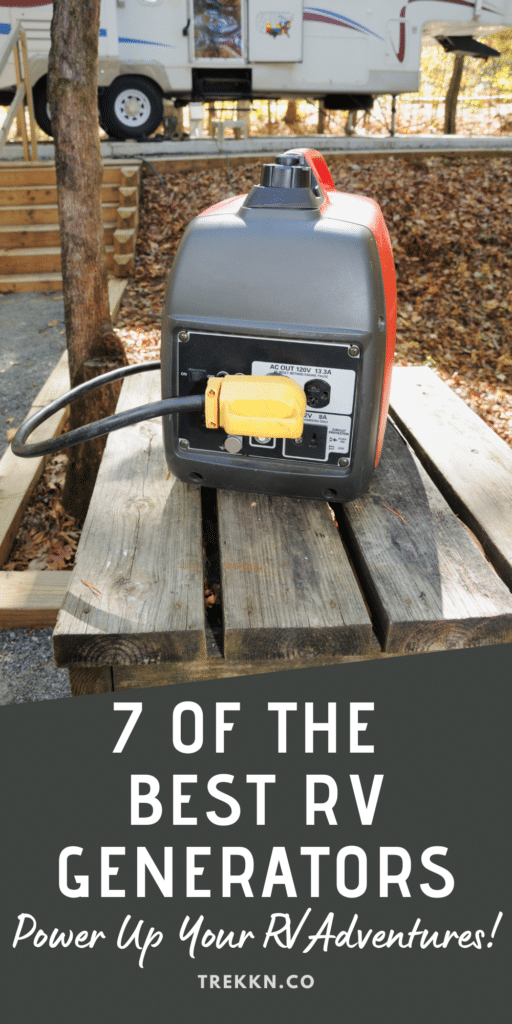
2. Westinghouse iGEN2200 Lightweight Inverter Generator
Next up on our list of the best RV generators for you to take a close look at is a brand name that you will no doubt recognize. After all, the brand has been around since 1886!
Gas powered, parallel capable, with long run time.
OVERVIEW OF WESTINGHOUSE PORTABLE RV GENERATOR
Let’s give you a quick rundown of everything this little workhorse offers you for your RV adventures:
- Dimensions and Weight – 19.8″L x 11.4″W x 17.9″H, 47 lbs
- Fuel Source – Gasoline (1.14 gallon fuel tank capacity)
- Run Time @ 25% Load – 12 hours
- Parallel-Ready – Unit is parallel capable. Use a Westinghouse parallel cord to combine the iGEN2200 with a second unit to increase wattage and amperage.
- Engine Displacement – 80cc
- Warranty and Support – 3-year limited product warranty plus Lifetime technical support
- Noise Level – Slightly quieter than Champion: 52 dBA at 23 ft, exceeding National Park Service requirements
- Price – About 1/3-1/2 the price of a comparable “top of the line” inverter generator options
- Track Record – The brand has been around since 1886; hundreds of online reviews
You might be interested to know that this particular RV generator is available in a Camo-colored body as well if that’s more your groove.
Other than the dual fuel feature that we saw on the Champion generator, this Westinghouse iGen option brings just about everything to the table that many RVers will be looking for. With nearly 140 years of history and a wealth of online reviews to boost your confidence level, you can’t count out this well-priced and feature-rich inverter generator option.
PARALLEL-READY
Let’s make sure you understand the benefits of a parallel kit and what the term parallel-ready means when trying to find the right generator.
Assuming you purchase a 2200-watt unit for your travel trailer, you may find that you are unable to consistently run the air conditioning because of the heavy load that the compressor places on the generator.
HOW TO RUN RV A/C WITH GENERATOR
At that point, you would have three options:
Knowing this is what your post-purchase options look like, you may decide to level-up from the beginning and go with a beefier model with increased amp output.
TRACK RECORD
I don’t think you can overstate the importance of purchasing a product with a decent track record, from a brand with long operating history. If you’re interested in peace of mind about your purchase, this is a must.
With the history of Westinghouse and the reviews available online for their inverter generator line of products, you should have all of the info you need to make an educated decision about what you want to power your RV and your adventures.
3. Generac GP2500i Portable Inverter
Coming in at the #3 spot is a brand you’re probably not quite as familiar with, but don’t discount it just yet. But believe it or not, Generac has been active in the “power solutions” space for more than 60 years, since 1959!
Fuel powered, lightweight and compact inverter generator.
QUICK OVERVIEW OF GENERAC GAS GENERATOR
So this one isn’t a recent arrival in the generator space by any stretch, but let’s see what’s hiding “under the hood” of this black and orange beauty:
- Dimensions and Weight – 19.7L x 11.4W x 17.9H inches, 46.6 lbs (dry weight)
- Fuel Source – Gasoline (1.2 gal capacity)
- Run Time @ 25% Load – 10.75 hours
- Engine Displacement – 80cc
- Parallel-Ready – Run two Generac inverter generators in parallel (with a separate parallel kit) for added power
- Warranty and Support – 2-year limited product warranty
- Noise Level – Not provided…so please be sure and contact the manufacturer before purchasing to check
- Price – About 1/2 the price of comparable “top of the line” inverter generator options
- Track Record – Generac has over 60 years of operating history in the power generation space; many online reviews
Now, I’m going to be completely honest with you here: I am a bit frustrated with the less-than-stellar job that Generac has done to ensure all relevant information for their products is available online. I’ve been digging, but it just doesn’t seem to be there.
NOISE LEVEL
For instance, as you can see in the table above, I was not able to find the noise level (dBA) listed on Amazon nor on the company’s website or in its product brochure. I tried, honest! But all I could get was references to “quiet operation”. Not that helpful.
This fact does give me a bit of hesitation about this particular model. I mean, nobody wants a loud and obnoxious surprise after purchasing an inverter generator for their RV. But don’t rule it out completely without doing a bit of your own checking around if this generator looks pretty attractive to you. Maybe you’re a better sleuth than I am.
4. DuroMax XP2300iH Dual Fuel Portable Inverter Generator
As with Champion Power Equipment, DuroMax was established in 2003. The company is headquartered in California.
Dual-fuel, parallel-ready inverter generator.
LED DISPLAY
One of the first things you might notice about this inverter generator that sets it apart from the models we have covered so far: It provides an LED digital display! Normally, you will only find this feature on the larger models in the 3400-watt range and up.
This handy digital control center will allow you to track voltage output, gasoline level, and maintenance hours on your generator. Knowledge is power, my friend, so this feature definitely got my attention.
QUICK OVERVIEW OF DUROMAX PORTABLE RV GENERATOR
Aside from that feature, it has plenty more to offer as well, not the least of which is the beautiful dual fuel technology.
- Dimensions and Weight – 22L x 14W x 20H inches, 58 lbs (dry weight)
- Fuel Source – Gasoline (1.1 gal capacity) or Propane
- Run Time @ 50% Load – 6.5 hours (gas) or 18.1 hours (propane)
- Engine Displacement – 80cc
- Parallel-Ready – Run two DuroMax inverter generators in parallel (with separate kit) for added power
- Warranty and Support – 3-year residential limited product warranty
- Noise Level – 52 dBA @ 25% load
- Price – About 1/2 the price of comparable “top of the line” inverter generator options
- Track Record – Brand has over 18 years on the market; hundreds of online generator reviews
COMPARISON OF DUROMAX vs CHAMPION
I’m not sure about you, but I find it pretty fascinating that this DuroMax XP2300iH dual fuel option outweighs our top choice (Champion 2500-watt Dual Fuel) by about 19 pounds! On top of that, it provides lower wattage than the Champion while also being a bit pricier.
Having said that, this unit does have wheels and an extension handle to allow you to wheel it around without breaking your back. So they have definitely compensated for some of that extra weight at least.
But at the end of the day, you can probably see a bit more justification for our #1 choice now.
5. WEN 56225i Portable Inverter Generator
Alright, three more RV generator options to go! Hang in there and we will help you find the option that’s right for you.
Headquartered in Elgin, Illinois, WEN has been around a lot longer than I initially suspected: 70 years and going strong (founded in 1951). They are a major manufacturer of all kinds of power tools and lawn & garden equipment as well.
Lightweight, quiet operation portable inverter generator.
QUICK OVERVIEW OF WEN 56225i PORTABLE RV GENERATOR
And now to the nitty gritty to see how this option stacks up:
- Compact and Light Weight – 17.3L x 11.5W x 17.5H inches, 39 lbs (dry weight)
- Fuel Source – Gasoline (1 gal capacity)
- Run Time @ 50% Load – 7 hours
- Engine Displacement – 79cc
- Parallel-Ready – Run two WEN inverter generators in parallel (with separate kit) for added power
- Warranty and Support – 2-year limited product warranty
- Noise Level – 51 dBA @ 25% load
- Track Record – For 70 years, WEN has been producing power tools and equipment
After seeing so many heavier units in a row, I was pleasantly surprised to see another truly lightweight generator option with WEN. Just like our top pick, this WEN inverter generator is only 39 lbs! With comparable dimensions as well, this compact unit should not be quickly overlooked.
In addition, this WEN generator appears to be slightly quieter than the Champion model at the #1 spot. However, this can be a bit confusing as some manufacturers report the dBA level “@ 25% load” while others report it “@ 23 ft”. So be sure you are comparing apples to apples when it comes to your noise levels because it’s not necessarily straightforward.
LOSING SOME WARRANTY
We should also note that you are giving up a year of warranty coverage if you choose to go with WEN over Champion. And while WEN may indeed offer lifetime technical support, they do not make a point of letting you know that like Champion does. I like a brand that stands behind their products and is not afraid to tell you about it!
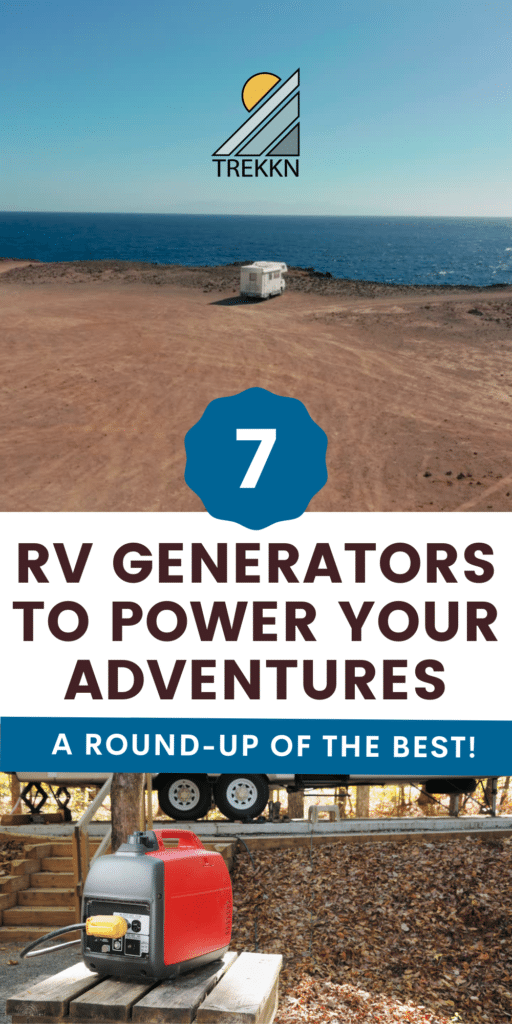
6. Honda EU2200i Portable Inverter Generator
Last but not least in the “2500-watt and under” category (before we take a look at one beefier option) is what many consider the Gold Standard in portable RV generators: yes, it’s time for Honda.
Honestly, it makes sense to call it the Gold Standard generator based on how much “gold” you will part with for one of these bad boys!
Gas powered, quiet inverter generator with advanced carbon monoxide detection system.
WHY I LOVE HONDA
Now, don’t get me wrong here. I LOVE Honda. Well, I love the cars at least. I have owned five of them over the past 15 years or so, including one right now, and some would say I have a bit of an addiction. (They’re wrong. I can stop anytime I want to. Probably.)
And why do I love Hondas? One of the top reasons is their overall reliability and low cost of ownership.
Based on the feedback I am seeing from current Honda generator owners, the ease of use and reliability of these units is the major selling point for RVers and power-seekers alike. It leads the pack in overall customer satisfaction based on everything I have seen.
QUICK OVERVIEW OF HONDA EU2200i
Let’s look at the nuts and bolts of how they match up with the rest of our lineup:
- Compact and Light Weight – 20L x 11.4W x 16.7H inches, 47.4 lbs (dry weight)
- Fuel Source – Gasoline (0.95 gal capacity)
- Run Time @ 25% Load – 8.1 hours (3.2 hours at rated load)
- Engine Displacement – 121cc
- Parallel-Ready – Run two Honda inverter generators in parallel (with separate cable) for added power
- Warranty and Support – 3-year “top to bottom” product warranty
- Noise Level – 48 dBA @ 25% load
- Price – Large discrepancy between MSRP on Honda website and higher prices found elsewhere online
- Track Record – Well, this is pretty obvious…it’s about as strong as it gets.
WEIGHT AND NOISE
Just looking at the data, the Honda is heavier than most other models we have covered, less fuel efficient and has the smallest fuel capacity.
On the other hand, it is possibly the quietest generator that we have examined and has the highest engine displacement by far. It packs quite a punch for its small size, which makes that low noise level even more impressive.
LACK OF POWER PORTS
What is missing on the Honda Generator that we have become accustomed to on previous brands? Additional power ports. With Honda, you have two (2) 120V, 15A outlets….and that’s it. No 12V. No USB. I find this pretty odd, honestly, as it requires you to bring your own additional adapters and charging devices to experience the full convenience that you find included with other brands.
These power outlet features may carry little importance for you. Only you can decide on the right combo.
BUT THE BELLS AND WHISTLES
What it lacks in power ports, Honda attempts to make up for in other ways.
The most desirable added feature for most folks will probably be the Bluetooth capability and Honda My Generator app. This combo allows you to wirelessly stop your generator as well as monitor its performance from your mobile phone, although there is no remote start. The app will also provide you with important maintenance reminders to keep your generator running smoothly for years. So yeah, that’s some cool points for sure.
In addition, this Honda generator is equipped with a built-in carbon monoxide (CO) detection system. If CO levels rise to unsafe levels, the generator will shut itself down. You can never overdo the safety features, so am definitely a fan of this one.
WHAT IS THE PRICE?
Prices are going to fluctuate online pretty regularly for any of the best RV generators we’ve covered, so we don’t list specifics here. Having said that, there seems to be a large discrepancy between the MSRP of this generator listed on the Honda Power Equipment site (lower) and prices we are seeing on other platforms (higher). This could be because they are in very high demand.
So the bottom line is to be sure and conduct your own research and due diligence before throwing money at someone. A little shopping around could make a big difference when it comes to this particular inverter generator.
Wow! We had a lot to say about that Honda. (I have a lot to say about any Honda, I guess.) I hope that it helped equip you to make an informed decision about the “power companion” that will best power your adventures.
7. Champion 4500-Watt Dual Fuel “RV Ready” Inverter Generator
And last but not least, we find ourselves right back in the neighborhood where we started: a beefier and “RV ready” option from the same manufacturer as our #1 pick.
- Operates on either gasoline or propane
- Electric Start
- Various Wattage options available
- RV ready with 120V 30A, plus two 120V 20A household outlets
Yes, this is the first RV generator with 30 amp plug that we have covered in this list. While this type of “RV ready” inverter generator is great for its power output and likely ability to power your RV’s air conditioner, it may be overkill for many RVers who are just looking for power to “the basics” (lights, coffee pot, microwave, charging devices, etc.).
A FEW DRAWBACKS: WEIGHT AND NOISE
And with added convenience does come a few drawbacks with this option:
- Heavier – More than 50 lbs heavier than the Champion 2500-watt option
- Larger – It will take up an extra cubic foot (approx.) of your precious RV storage space.
- Noise – Designed for RVs, this unit operates at 61 dBA
CHAMPION 4500-WATT RV READY GENERATOR OVERVIEW
Let’s dive in to all of the specs so you can really get a handle on what this Champion RV ready generator has to offer:
- Size and Weight – 23.2″L x 17.7″W x 20.1″H inches, 97 lbs
- Dual Fuel – Runs on gasoline or LPG propane for ultimate flexibility and extended usage
- Run Time – 14 hrs (gasoline) or 22 hrs (propane)
- Parallel-Ready – Realize you need more power after purchase? Add another Champion generator to the mix!
- Engine Displacement – 212cc
- Warranty and Support – 3-year product warranty with FREE lifetime tech support
- Noise Level – Very reasonable 61 dBA
- Price – Comparable or even less expensive than smaller “top of the line” inverter generators
- Track Record – Not a “new to market” product. There are thousands of consumer reviews available. Company established 2003.
- Electric Start – The only inverter generator on our list with this feature!
I want to reiterate here that this RV inverter generator is capable of powering your 30 amp RV, complete with air conditioner. But you must be aware that its performance will be impacted by the actual load that AC unit is putting on it (higher with extreme temperatures) and by the elevation at which you are operating the generator.
Also, technically speaking, this is not a 30 amp generator, even though it has a 30 amp plug for your RV’s power cord. Here is the actual output of this generator with both gasoline and propane:
- Gasoline Starting Amps at 120V – 28.3
- Gasoline Running Amps at 120V – 25.8
- Propane Starting Amps at 120V – 25.5
- Propane Running Amps at 120V – 23.3
Essentially, this means that if you are running multiple RV appliances or electrical devices in your RV at the same time that you are running your AC unit, it could overload this generator and cause it to shut down. But that’s far less likely to happen with this generator than with the others we have highlighted.
Bottom line? Even with the additional power that this unit offers, you have to pay attention and be smart with your power choices. This is especially true when you find yourself in locations with extreme temps and/or at higher elevations.
One con for me on this generator is simply that it doesn’t offer an LCD control panel display to improve overall user experience. But in the grand scheme of things, that’s a pretty small con when you look at all of the pros here. This one is made for easy RV use, no doubt about it.
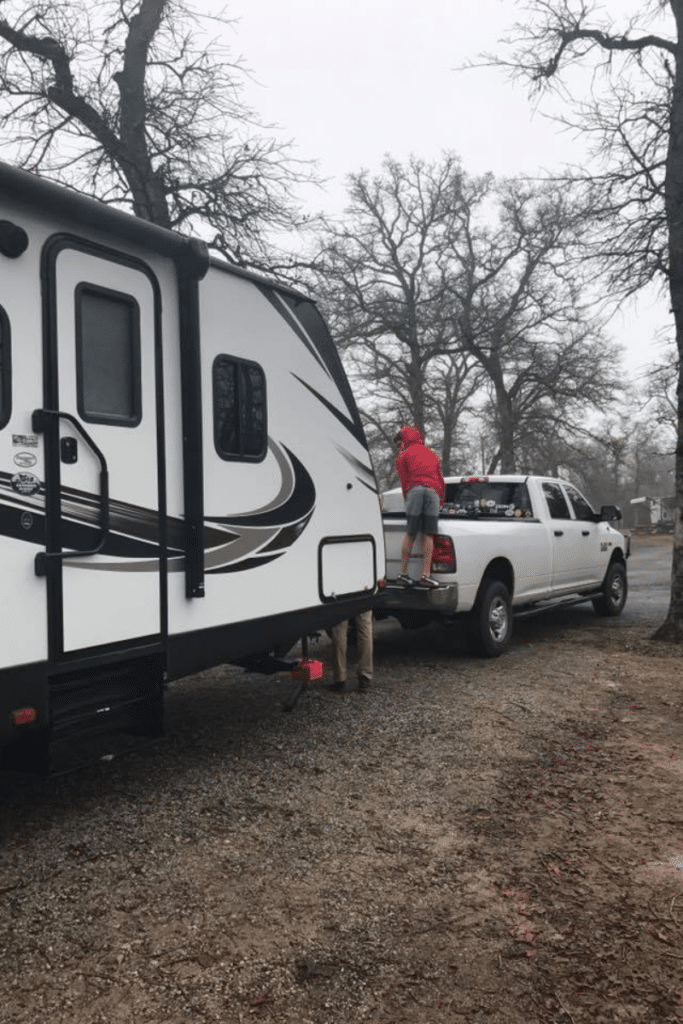
Best RV Generator FAQs
Alright, we have made our way through 7 very strong contenders for Best RV Generator. But as I said at the beginning of this looooong post, you’re the only one that can decide what “best” actually looks like for your RVing scenario.
With that in mind, we wanted to cover some of the most common FAQs related to RV generators and inverter generators. If you haven’t gotten through the “fog of choosing” yet, maybe these questions and answers will help you finally find the destination you’ve been looking for.
Inverter vs Generator: What’s the difference?
Let’s start off by clarifying one point: All of the products we have covered above are inverter generators, which are hybrids of a conventional generator and power inverters.
Before this golden age that we live in, your only choice for a generator was a conventional generator which ran on gasoline or diesel and produced a steady stream of power at its rated output. Typically, they were louder, heavier and not as safe for today’s sensitive electronics.
Inverter generators, on the other hand, are a fairly recent advancement in technology. They marry the power-producing capabilities of the conventional generator with the power inverting capabilities of a standard inverter (which draws from a DC source and inverts the power from DC to AC using a built-in microprocessor).
The result is a more efficient, lighter weight, and quieter power-generating device that is truly smarter and able to protect your electronic devices (like cell phones) by avoiding “overpowering” them and potentially damaging them.
And if you have any experience with the hefty diesel generators out there, an inverter generator will truly be a light and quiet treat.
What if the Inverter Generator I want doesn’t have a 30 Amp plug for my RV?
Good question! These were the kind of issues that really stumped me a few years back as an RV newbie. But the good news is that the answer to the question (and problem) about your RV power needs is very simple…and also very inexpensive.
If you’ve decided that one of the generators above in the 2200-2500 Watt range is going to be enough to power your critical electrical components, all you need is a power adapter (sometimes called a “dogbone” or “pigtail”). This adapter will plug into the 15 Amp outlet on your generator on one end, and the other end has a female 30 Amp outlet to plug your RV’s power cord into.
And problem solved! Probably…
The only other possible item you might need, if you want your generator further away from your RV than your power cord will allow (for a quieter experience), is a Heavy Duty 12-Gauge Extension Cord.
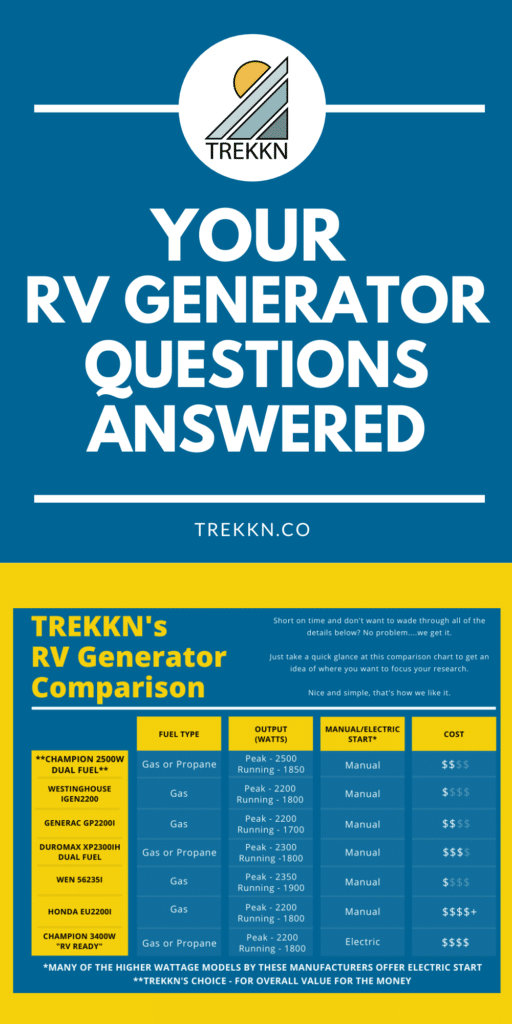
Should I add a “Soft Start” device to my air conditioner unit right away to reduce load on the generator?
As I mentioned above, the introduction of a “soft start” device into your life may be the best news you get all year. For some folks, it has allowed them to run their RV’s A/C unit with just a 2200-2500 Watt inverter generator! In at least one instance, it also allowed them to run their AC unit off of their lithium battery bank as well, which I find fascinating.
But the truth is, there are far too many variables involved in each person’s RV setup and typical use for me to be able to say for sure whether it will work for you. I am not an electrician and I don’t even play one on TV. So this question about a Soft Start Device will have to be left a bit open-ended.
Avoid overload generator with soft start technology to reduce peak amp usage when turning on and running RV air conditioner.
I think you have to assume, based on the output numbers, that you will not be able to use your AC unit running a 2500 Watt or lower generator. There could be unique circumstances that might make it possible, but don’t count on it.
I will say this: With the added cost of the device and the hassle of installing it (I’ve heard it can be a bit complicated), you might want to test things in your driveway without it first and see how things go.
Try out different electrical loads by turning devices and appliances off and on and see how your inverter generator performs. Then make your decision before heading out on your first RV trip with your new generator along for the ride.
Here is a YouTube video that shows you how to install one of these devices on a travel trailer:
If you do decide to add a Soft Start device after thinking all of this through, you will be able to enjoy ongoing benefits of both reduced fuel consumption and extended generator running times! Both are huge pluses in my book.
How do I properly maintain my RV inverter generator?
Once you have decided to spend several hundred dollars on an inverter generator, the best thing you can do is properly care for and maintain it so that it can serve you for many RVing and camping seasons to come.
FOLLOW PROPER “BREAKING IN” PROCEDURES BEFORE FIRST USE
When you first receive your generator, you have to be sure not to just throw it in the RV and head out to put it to work. Every generator has a “breaking in” procedure that will be detailed in your manufacturer’s user manual. Yes fellas, you need to read the manual and follow directions, no matter how much it hurts your soul.
Normally, these procedures are fairly quick and easy to follow, but it will take a little bit of your time and attention. In the end, I guarantee it will pay off in terms of extended generator life.
AVOID USING OLD GASOLINE
Probably one of the worst things you could for your inverter generator is to use old gasoline that has been sitting in the generator for more than 30 days. (You can add fuel stabilizer to the fuel tank which will extend the service life of the fuel and help you avoid having to empty the fuel tank for extended storage.)
Some generators are equipped to run the fuel tank dry and also dry out the carburetor as well, extending the life of your generator and reducing potential repair costs. Keep your eye out for that handy feature!
CHECK AND CHANGE OIL REGULARLY
As with any internal combustion engine, it is absolutely imperative that you pay attention to the level and quality of your engine oil. The oil level should be checked with every use of your generator.
In addition, the oil (and filter) should be changed approximately every 100 hours of use, or every season, whichever is shorter. It will take you an extra 15-20 minutes at the most and will save you plenty of money and headache in the long run.
PROPERLY STORE GENERATOR AT THE END OF THE SEASON
Whatever you do, please do not simply leave your generator sitting in your RV’s storage area at the end of your RVing season without taking any steps to properly store it long-term. You will have yourself a frustrating start to your next season is you choose to go this route.
Instead, follow these best practices to be sure your inverter generator is ready to roll when the open road beckons:
- Start and run your generator for 30 minutes every 30 days when in storage to keep all components if top working order.
- Store in a dry, safe place away from sources of moisture to avoid corrosion of generator components.
- Add fuel stabilizer prior to storage if you are keeping fuel in the fuel tank; run engine for 10-15 minutes to circulate stabilizer through the engine for proper protection.
- If you choose not to add fuel stabilizer, completely drain fuel from the generator, including from the carburetor.
CLEAN GENERATOR OFTEN AND MONITOR FOR LEAKS
At least once per season, clean generator components with engine degreaser and remove any battery acid build-up from batter posts (if accessible). Keeping the generator clean will help you more easily detect any leaks (fuel, oil) which have developed before these leaks become a major threat to the life of your generator.
Which of these Best RV Generators is the perfect fit for your RV lifestyle?
Believe it or not, I think we’ve covered everything we possibly can to help you find, purchase and properly care for your next RV inverter generator! But I will say that your first source of information regarding care and maintenance should be your manufacturer’s user manual. Don’t be scared of it!
The only thing that remains is for you to consider all of this information and decide which of these options is going to serve you best in your RV adventures. This may not be the easiest decision you’ve ever made, but don’t allow yourself to get stuck in “paralysis from analysis” mode! This is a mode I know well, and it doesn’t accomplish anything.
Take all of the info, look at customer reviews, consider your expected electrical needs and then make the choice that’s right for right now. As we mentioned several times, if you end up needing more power you can always run a second generator in parallel with your first purchase and provide for all of your electrical needs.
The most important thing is to get out there and live the good life as soon as possible! Only you can make that happen.
Happy camping, my friend!
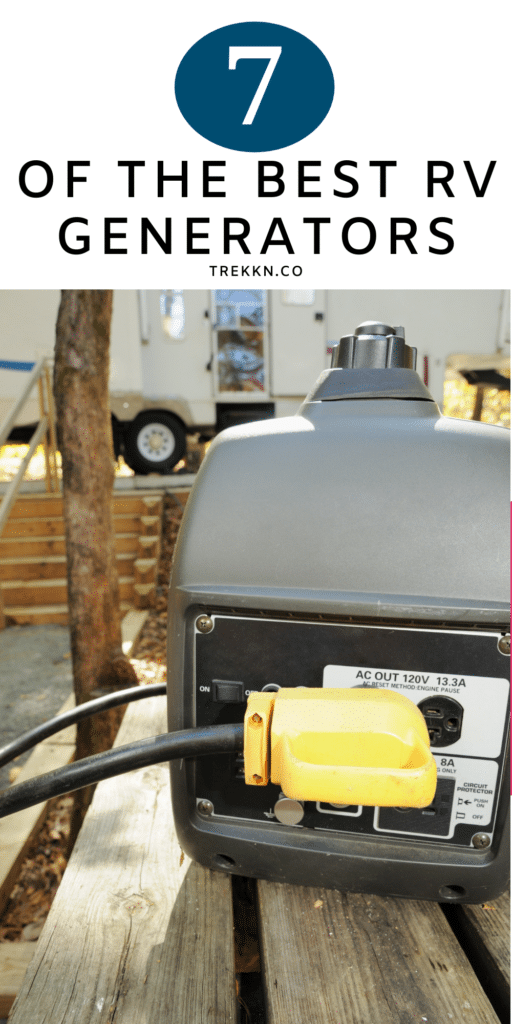

Todd loves a competitive game of table tennis, a breathtaking hike, and exploring new places. He lived and traveled in an RV with his family as they traveled throughout much of the US and parts of Canada. Todd has extensive knowledge about RV travel, safety, and accessories and has shared many of his stories here on TREKKN. When he’s not busy launching and building small businesses, you may find him staring at pictures of Glacier National Park (probably his favorite spot on earth).


